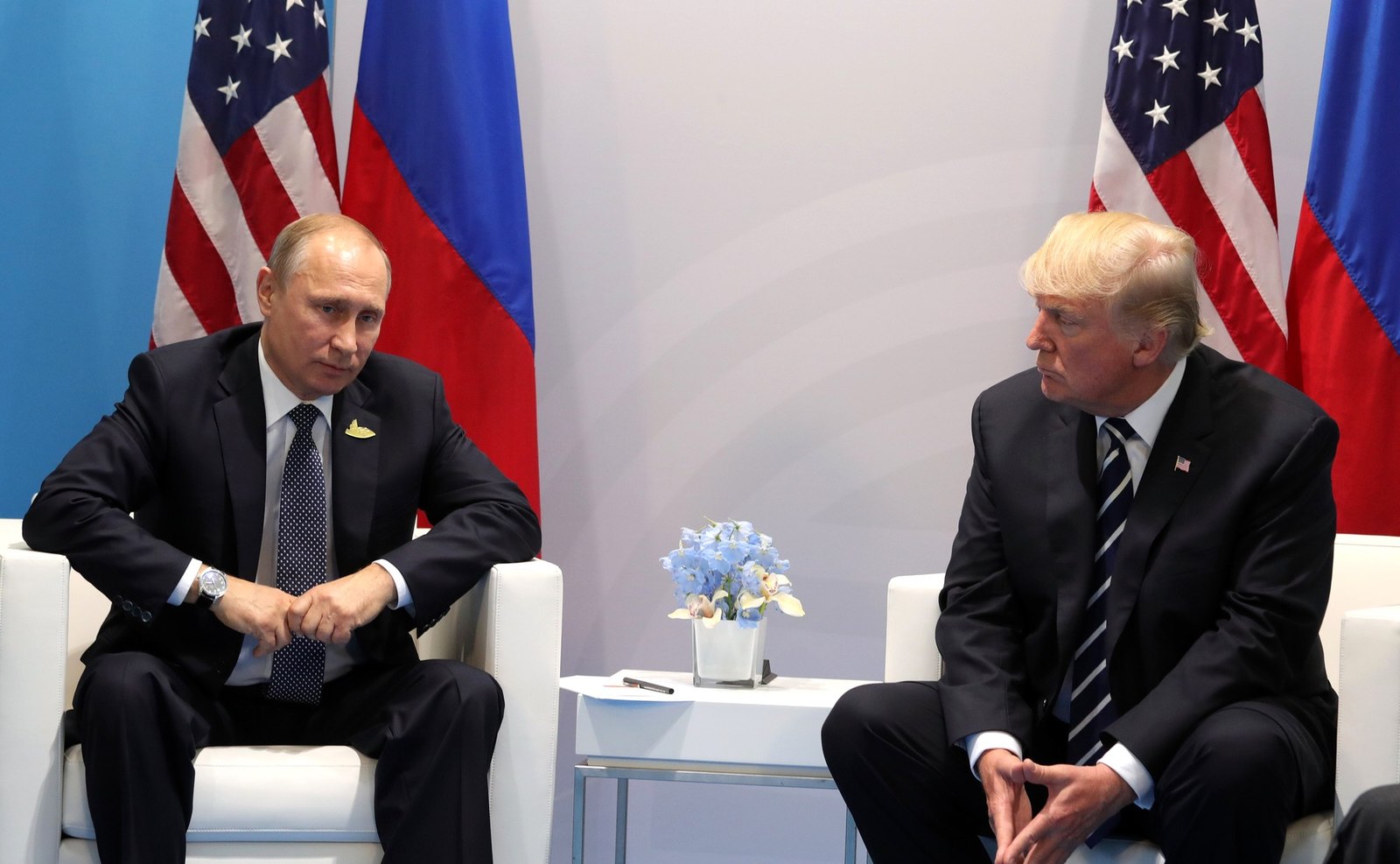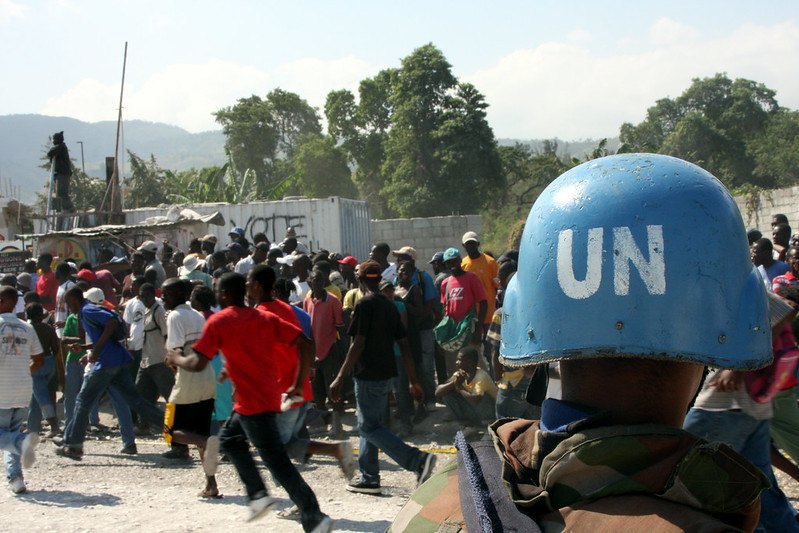Three Risks Looming Over the Trump-Putin Meeting

President Trump is meeting with Russian President Vladimir Putin this Friday in Alaska. Numerous things have been said about this meeting, including the White House press secretary setting the bar for success at an achievable level as a “listening exercise” while others have expressed significant reservations about the potential outcome without Ukraine at the table. But there are three important risks to international law and security that Trump and his team should be tracking.
First, and perhaps most difficult to address when negotiating with Putin, Trump must work to diminish the perception that the meeting is somehow a reward to Russia after its illegal invasion of Ukraine. The persistence of such a perception might normalize the idea that a country can redraw borders through force, which places all countries’ borders at risk. Russia will argue that it deserves the new territory it has seized in its war, but the fact that this seizure was unprovoked and unjustified means that it cannot be allowed to keep the territory without negating the value of international law.
Russia claims that Ukraine was somehow diminishing Russian security prior to Putin’s full-scale invasion in February 2022, but there is no evidence that the much smaller nation was moving forward with NATO accession. Putin also claimed, without evidence, that the Ukrainian government supported Nazism—despite the fact that it is run by President Volodymyr Zelenskyy, who is Jewish. Both of these false claims are merely attempts by Russia to justify its continuing and blatant violation of Ukrainian sovereignty in direct contradiction to the United Nations Charter.
Prior to its 2022 full-scale invasion, Russia already controlled Crimea, an internationally recognized autonomous republic of Ukraine, as a result of its previous invasion in 2014. Russia was also expanding its significant control over one of Ukraine’s neighbors, Belarus. There was no reason for Russia to continue its attack on Ukraine except for the illegal and norm-breaking desire to conquer territory and establish political control over Ukraine.
Putin seems to have never relinquished his belief that Ukraine is still part of Russia, repeatedly denying that Ukraine was even a country, let alone that it had a separate population and culture. If other countries perceive that Trump is rewarding Russia in any way for its illegal invasion, he would be accused of supporting the precedent that larger, more militarily powerful countries can take what they want from smaller sovereign nations. Not only would this dishonor the hundreds of thousands of lives lost or ruined as a result of Russia’s invasion, as well as feed a global arms race, but it would also further normalize Russia’s unjustified disregard for the pillars of international law. This outcome would ultimately harm every nation. Recognizing that this leaves very little negotiation space, Trump should see if there is any willingness by Ukraine to demarcate the territory in eastern Ukraine and Crimea that Russia has controlled since its initial invasion in 2014. This would not resolve the problem, but it could allow a ceasefire to proceed while conversations continued on how to address this territory. Russia would undoubtedly seek some element of legitimacy for its illegal activities, but Ukraine could potentially extract some security or other gains during this ongoing discussion as well.
Russia’s war on Ukraine squarely violates and thus weakens the UN Charter, as well as treaty law. The most salient example is the 1994 Budapest Memorandum, in which Russia promised not to invade Ukraine when Kyiv handed over its share of the Soviet Union’s nuclear arsenal. But allowing Russia to benefit from its unprovoked war would result in an even more serious consequence: More nations around the world could decide that the only thing that can protect them from invasion is a nuclear arsenal of their own.
As larger nations diminish and disregard international law, smaller nations may even turn away from nuclear umbrellas, the agreements of nuclear weapon states to protect non-nuclear weapon states, on the belief that the only credible way to ensure a nation’s survival, in the absence of strong and enforceable international law, is to develop one’s own nuclear deterrent. While some observers in the United States may see a nuclear-armed Poland or South Korea as an appealing outcome, in reality, it would decentralize conflict and make future risk-reduction moves vastly more complicated. And there’s no guarantee proliferation would be contained to nations friendly to the United States. This is the proliferation wildfire that Trump could spark if he cedes Putin meaningful benefits from his invasion.
A second significant risk that Trump should avoid is negotiating away necessary defensive capabilities either in Ukraine or in Europe as a whole. When the Biden administration met one last time with the Russian government in advance of its 2022 full-scale invasion of Ukraine, Deputy Secretary of State Wendy Sherman warned Russia that if it invaded Ukraine again, NATO would undoubtedly expand in membership while tightening its coordination and enhancing its defensive force posture. In other words, the very thing that Russia was complaining about—the expansion of NATO since 1997—would be exacerbated by Russia’s own actions.
Russia went forward nonetheless. In an authoritarian country without a free press, Putin has continued to justify his illegal “special military operation” by claiming it is a necessary defensive action designed to increase Russian security. For many years, Moscow has complained that Russia’s perception of an unbalanced “security equation” has not been taken seriously by the United States or its allies. Russia feels that its sense of insecurity must be given more weight by the West—or it will be justified in claiming whatever territories it sees fit to protect itself.
The problem with this “security equation” is that it does not take into account the very real security requirements of Russia’s neighbors and Europe as a whole that Russia itself has generated. Russia has repeatedly disregarded international law, violated its neighbors’ sovereignty, and even threatened nuclear use against those that oppose its will. The United States, NATO, and Europe must have some way to prevent Russia from continuing its imperial behavior.
In Alaska, Trump must be careful not to diminish any U.S., NATO, Ukrainian, or European defensive capabilities in order to placate a misplaced perception that Russia can stop destabilizing the region only if it has no more insecurities. Russia will only feel more emboldened if its version of the European “security equation” becomes reality.
That said, not diminishing U.S. defensive capacity is different from recognizing the stabilizing value of confidence-building measures that could be provided reciprocally. In other words, there could be a way to provide oversight of, for example, long-range strike capabilities or troop movements on both sides of the conflict that would be stabilizing if done in a manner that did not create vulnerabilities, was transparent and independently verifiable, and provided advanced warning of violations.
The final risk that Trump must avoid is the misperception that he will be able to solve in one meeting the massive security challenges that Russia poses. There is a modern news cycle-driven habit of thinking that one meeting, one bombing, one treaty, or one political statement can make or break long-lasting security. The Budapest Memorandum was for some time hailed as a success in removing nuclear weapons from Ukraine while keeping the newly independent country safe from invasion. But the resolution of one challenge can sometimes provide the space and time for aggressors to figure out how to continue their illegal activities in a way that is harder to stop. This is especially true when relevant parties fail to sustain a resolution—whether through disinvestment, distraction, or shifting politics—and create openings for cheating or circumvention.
Recognizing that President Putin waited almost eight years before expanding his illegal invasion to take the rest of Ukraine, the Trump administration must develop an understanding that continuing engagement, monitoring, verification, and oversight are the baseline requirements to addressing serious international law and security challenges. Even if Putin agreed to every demand to cease his war on Ukraine today, continuing engagement and oversight over decades would still be necessary to ensure follow-through. The great majority of the world is hoping for a solid and enduring ceasefire in Ukraine. But no one wants that ceasefire to come at the cost of empowering Russia or other aggressor nations to use force again for territorial expansion. Any ceasefire must have the clear support of the Ukrainians as well as the majority of Europeans to ensure their commitment to work together and take effective action if the ceasefire fails.
None of this will be easy—or fast—and whatever comes out of Friday’s meeting should be observed in that light. But President Trump has an opportunity to open the door to more serious and credible discussions between Ukraine and Russia, kick-starting a durable process meant not just to end the war as soon as possible, but to build a long-lasting structure by which the two countries can maintain that peace.

.png?sfvrsn=4c1fe9ba_3)


.jpg?sfvrsn=104df884_5)
